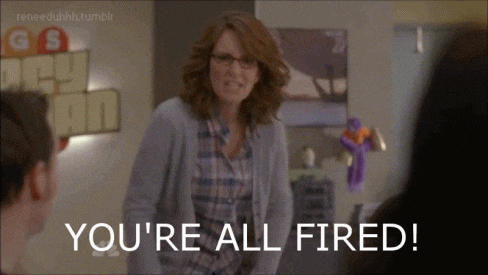Job Loss is Trauma: A Reality Check for Anyone Doubting It
I was drinking an iced latte and doom-scrolling through government websites when I found it—a single sentence on the Department of Labor's site, set in 12pt Arial like every other bureaucratic fact that's meant to blend into the beige: "Being laid off from your job is one of the most traumatic events you can experience in life."
I had to read it twice. The government, that great institutional voice of understatement and legal hedging, called job loss trauma without air quotes or asterisks. No "can be stressful" or "may cause difficulties." Just trauma, sitting there between guidelines about unemployment benefits and COBRA coverage, like someone finally decided to tell the truth in the worst possible font.
So if being laid off causes trauma, exactly, are we still pretending that unemployment is a personality test you can pass with enough networking coffee chats and LinkedIn optimism?
The Data Doesn't Lie (Even When We Want It To)
Let me give you the numbers before your brain tries to convince you this is all in your head and that job loss trauma doesn’t exist.
Losing your job ranks seventh among life's most stressful experiences. More stressful than divorce. More stressful than sudden hearing loss. More stressful than losing a close friend to death. Which means there are only six things worse that can happen to you, and most of them involve eulogies and cemetery plots.
It takes an average of two years to recover from the psychological trauma of losing a job. Two years. That's 730 days of your nervous system behaving like you're being hunted through dark alleys by every worst-case scenario you've ever imagined, all at once.
The physical toll is equally brutal. For healthy employees without preexisting conditions, the odds of developing a new health condition rise by 83% in the first 15 to 18 months after a layoff. Your body keeps the score for something you never auditioned for—recording the damage in blood pressure readings and cortisol levels and the way your hands shake when you check your bank account.
The mental health statistics read like a horror movie shot list:
Depression risk doubles for displaced workers
Substance abuse risk quadruples
Risk of violent acts increases sixfold
Suicide risk rises by 1.3 to 3 times
That same rejection that made you cry while walking your dog at 3 pm on a Wednesday is quietly rewiring your brain's threat-detection system, convincing your amygdala that danger is everywhere and safety is a myth.
The Financial Wound That Never Fully Heals
I know this math intimately. I spent all of 2024 watching freelance opportunities dry up like puddles in August, hustling for scraps while applying to full-time roles that went nowhere. When I finally landed my content marketing job in January, I was starting from a deficit so deep I could barely see daylight. I spent those first few months rebuilding my savings, brick by careful brick, like someone constructing a fortress out of paychecks.
I built it back. Slowly. Painfully. With the kind of discipline that feels like punishment.
And then in August, eight months after we all started, the entire team got let go in a 12-minute Teams call at 9 am on a Friday. Now, I watched my savings—the ones I'd clawed back from nothing—start to dwindle again. Same pattern, different year, equally devastating.
A Personal Detour Into the Wreckage
None of us has found work since the layoff. Not me, not any of my former teammates—people I'd come to actually like, which is rare in corporate America. We'd all started together in January, bright-eyed and foolish enough to believe in team-building exercises. Eight months later, we were gone.
It's devastating in the way only invisible things can be devastating. Painful in a way that makes you doubt whether pain is even the right word, or if there's some German compound noun that better captures the specific flavor of checking LinkedIn at 2 am to see if anyone, anywhere, is hiring.
I see thousands of posts every week from people describing the same experience. The same confusion. The same shame that metastasizes in the silence between interviews. The same job loss trauma is playing out in real-time across industries and time zones. I find solace in knowing I’m not the only one.
We're all out here drowning together, which doesn't make anyone less wet, but at least confirms the water is real.
We Built a System That Inflicts Trauma and Demands Gratitude
The hiring process we've constructed would be comedic if it weren't so cruel. We've designed a system that inflicts medical-grade psychological damage and then asks people to project enthusiasm through Zoom interviews with ring lights and virtual backgrounds.
It wrecks cardiovascular health and then wonders why candidates seem "low energy." It doubles depression risk and then passes on applicants who don't radiate enough passion for corporate mission statements that were written by committee and mean nothing.
Consider what we're actually asking of people experiencing job loss trauma:
Rewrite your resume seventeen times to appease ATS bots
Network with strangers who might know someone
Perform gratitude for "opportunities" that ghost you after four rounds
Maintain professional optimism while your savings evaporate
Pretend financial desperation doesn't exist during salary negotiations
Perform "culture fit" while your nervous system screams danger
Your body is treating unemployment like an emergency because it is one. The fight-or-flight response isn't malfunctioning when you wake up at 4 am with your heart racing—it's working exactly as designed, responding appropriately to a legitimate threat to your survival.
The Armchair Experts Can Take a Seat
The worst part isn't the job loss trauma itself. It's the chorus of well-meaning advice-givers who've never missed a mortgage payment telling you to "stay positive" and "trust the process."
The LinkedIn influencers are posting about resilience from their salaried positions. The career coaches are selling courses on "mindset shifts" as though outlook alone pays rent. The relatives who suggest you "just apply everywhere" as if volume was ever the problem.
These people mean well, probably. But they're prescribing ibuprofen for a compound fracture.
They're asking you to optimize your cover letter while your world collapses. To network authentically while performing stability you don't feel. To demonstrate passion for industries that demonstrably don't value human life beyond quarterly earnings reports.
And the worst part? They get to go back to their jobs after dispensing their wisdom, while you're left alone with advice that doesn't pay bills and platitudes that don't quiet your nervous system.
What Actually Needs Fixing (Spoiler: It's Not You)
If you're living through job loss trauma right now—losing sleep, losing savings, losing the version of yourself that used to feel anchored to something solid—let me be clear:
You’re not weak. You're not dramatic. You’re not too emotional. You're not "taking it too personally" or "making it mean something about your worth." You are living through a medically documented, psychologically verified, financially catastrophic trauma event.
You're not broken. You're reacting exactly as any human would under conditions no human should be expected to endure.
The psychological and financial pressure of job loss increases health risks, mental health challenges, and long-term financial instability—all while society expects you to treat unemployment like a minor inconvenience you can overcome with the right attitude and a better LinkedIn headline.
The system that needs fixing isn't your resume. It's not your interview skills or your network, or your personal brand. It's the entire apparatus that treats human beings as disposable and then gaslights them into believing their suffering is a personal failure rather than a predictable outcome of corporate indifference.
The Truth Nobody Wants to Say Out Loud
Job seeking isn't a character-building obstacle course. Job loss trauma isn't preparation for resilience. Unemployment isn't happening to you because you failed to be good enough.
It's happening because we've built an economic system that prioritizes shareholder value over human survival, that treats layoffs as strategic pivots rather than violence, that asks people to compete for the dignity of being able to afford groceries.
Your body knows the truth even when your brain tries to rationalize it away. That's why you can't sleep. That's why you cry in parking lots. That's why you feel hunted even when you're safe in your apartment, applying to jobs that probably don't exist.
You're not being dramatic. You're being human in a system designed to extract value from your humanity without ever acknowledging its cost.
If anything needs fixing, it's not you. It's every armchair expert demanding you act unbothered through an experience proven to wreck nervous systems, drain bank accounts, and unravel people from the inside out.
The trauma of job loss is real. The recovery is slow. The system is broken. And you—exhausted, scared, still showing up—are doing exactly enough.




